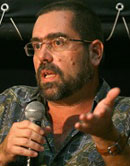
-
 Luis Alberto Lamata
Luis Alberto Lamata
(Venezuela, 1959-2025)
Egresado como Licenciado en Historia por la Universidad Central de Venezuela, Luis Alberto Lamata (Caracas, 1959) escribió desde muy joven para el cine y la televisión, donde ha participado en algunas de las telenovelas venezolanas de mayor éxito internacional: Topacio, Cristal, Señora, La traidora y Las dos Dianas. Filmó varios largometrajes dramáticos en video, y dos cortometrajes para cine, antes de estrenar Jericó (1990), su primer largometraje. En 1984 estrena su primer cortometraje para cine.
La más grande de sus creaciones, y una de las mejores del cine venezolano de su época, es Jericó, que acontece en un lugar de la selva americana a comienzos del siglo XVI, cuando un fraile dominico participa con sus miedos e ilusiones en una de las aventuras de conquista más crueles y alucinantes. Los cinco años que va a vivir entre los indios caribes, lo convertirán en un ser completamente distinto del que salió de España. Jericó obtiene el premio Ópera Prima en Biarritz, el Gran Premio Coral en La Habana y el Premio Especial del Jurado en Cartagena.
Si Jericó fue una ambiciosa producción histórica, la segunda película de Lamata, Desnudo con naranjas (1995) es también muy ambiciosa, con altos valores de producción, a pesar de los pocos recursos disponibles. Es una película de época, ubicada en un período crítico de la historia venezolana, pero aquí el tono es más de leyenda, de los mitos caribeños y de como éstos afectan la vida de dos seres. Partiendo de un cuento de Robert Louis Stevenson, Lamata nos trasplanta a mediados del siglo XIX en medio de una revuelta civil, y nos presenta a un indio alistado en el Ejército Liberal, que huyendo para salvar su vida, encuentra a una mujer, blanca, muda, y hambrienta. Se crea entre ellos un vínculo misterioso y juntos vagan por el Caribe, buscando una nueva vida.
Desnudo con naranjas participó en al menos treinta festivales internacionales y ha recibido reconocimientos en Sochi, Nuevo México y Trieste.
Luis Alberto Lamata (1959-) was born in in Caracas, Venezuela. He is a graduate in history at the Central University of Venezuela. Since an early age, he wrote for film and television, in which he has taken part in some of the most internationally successful Venezuelan soap operas: Topacio, Cristal, Senora, La traidora, and Las dos Dianas. In 1984, he made his first short film for the big screen. Lamata made some dramatic feature films on video and two short films for the big screen, before releasing Jericó (1990), his first feature film.The greatest of his films and one of the best of Venezuela cinema of its time was Jericó (1990), which is set in some place of the Latin American rainforest at the beginning of the 16th Century, where a Dominican friar takes part with his fears and hopes in one of the most hallucinatory and cruel adventure of the Conquest, but the five years he lived among the Caribbean native people made of him a completely different human being to the one who came from Spain. Jericó received the Best Work award in Biarritz, The Great Coral award in Havana and the Special Jury Award in Cartagena.
If Jericó was an ambitious historic production, Lamata´s second film, Desnudo con naranjas (1995) was very ambitious too, with high production values, in spite of the little available resources. The film is a costume drama sets out in a critical period of Venezuela History, but here the tone is like a legend of the Caribbean myths and how they affect the life of two human beings. Based on a Robert Louis Stevenson’s short story, Lamata takes the audience to the mid-19th Century in the middle of a civil revolt, and he also presents Indigenous man enlisted in the liberal army who running away for his life finds a hungry, dumb white woman. A mysterious bond form between them, together they wander through the Caribbean looking for a new life.
Desnudo con naranjas took part in at least thirty international film festivals and was awarded at Sochi, Nuevo México and Triestre.

Referencias en el Portal:
Jericó, 1990, Dirección
Desnudo con naranjas, 1995, Dirección
Miranda regresa, 2007, Dirección
El enemigo, 2008, Dirección
Taita Boves, 2010, Dirección
Bolívar, el hombre de las dificultades, 2013, Dirección
Parque Central, 2018, Dirección
Referencias en la Biblioteca Digital:
Cosme Cortazar sin hábitos (recorte)
El enemigo (video)
Jericó (recorte)
Miranda regresa (video)
Miranda regresa (video)

